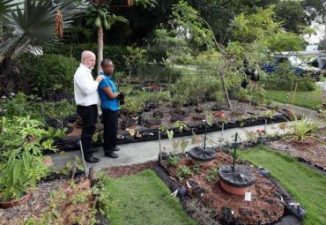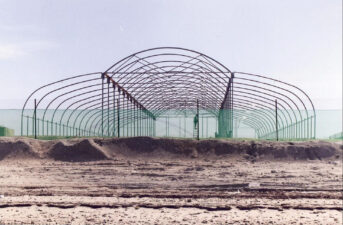
Hydroponics farming is a good solution for growing food in countries where water is scarce. A USAID program gives training to local farmers so they can grow their own food and livelihood. This couple is from Jordan.
The holiday season of Christmas in North America and Europe is packed with spending and gift-giving, especially with emphasis from major consumer holidays like Black Friday and Cyber Monday. Although this time of year has a large focus on consumption, many people also use it as an opportunity to give their time and money to the charities that speak most to them.
US supports hydroponics to revitalize Mideast food, water and security
Giving Tuesday has become a powerful movement for this. It was created to harness the power of collective generosity. Each year, the international holiday falls on the Tuesday after Thanksgiving, Black Friday, and Cyber Monday. Impact businesses and organizations have benefited greatly from the increasing public awareness of the day. Last year, over four hundred million dollars were donated this way.
A common category of giving is hunger and poverty relief in developing countries. There are hundreds of thousands of organizations focused on the issue in regions all around the world.
Although many charities are indeed making real, sustainable change for those they are serving – a lot of them are not. People have heard of organizations misusing public donations but one could argue that there is something even worse: an organization aiming to do good but unknowingly making circumstances worse for those they are trying to help.
The problem happens when an organization or business creates a model for a problem that they do not fully understand. For example, if a school were to raise money to bring an impoverished community free bread, this seems like it will genuinely help the people served, but it actually adds to the perpetual state of poverty this community is in.
Hypothetically, a baker in that community was making and selling bread. But when the donated bread was distributed, no one saw a reason to purchase bread any longer. This put the baker out of business, suppressed the local economy, and contributed to the free-aid mentality of the larger community, making them unmotivated to start businesses and therefore contributing to the cycle of poverty.
10 refugee shelters we hate to love
“Poverty in developing countries is a complex issue and the public must do their due diligence by researching the charities they are giving to,” says John Leary, Peace Corps Veteran and Executive Director of international development nonprofit Trees for the Future. “Time and time again, our organization has entered communities where other nonprofits have offered a short-term, short-sighted solution, but provided nothing that will allow them to escape hunger and poverty for good.”
Trees for the Future is working to end hunger and poverty for smallholder farmers through revitalizing degraded lands. They are not giving the fish but the hook so farmers can learn how to take care of themselves. A video below about Trees for the Future and their work.
Tips for doing the right kind of good
On Giving Tuesday or whenever you are giving, go beyond looking up a charity’s place on nonprofit ranking sites. Take a deeper, more intentional look, read about the organization and make sure that they understand the core of the problem they are solving.
Read about the staff and confirm that the organization is run by experts on the subject matter. Ensure that one of the organization’s key principles is training and education. This shows that the beneficiaries are being informed, are encouraged to be entrepreneurs, and can eventually live independent of aid.
When you give, you feel good. When you contribute to a special cause, you feel a greater sense of contribution. When you take the time to research an organization and its work, you can have full confidence that you are part of the solution.



